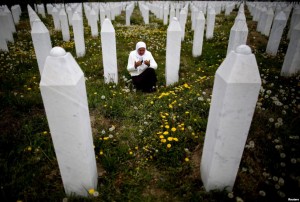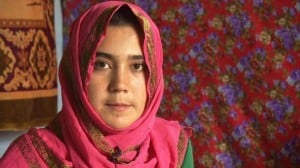Indonesia had its elections last Wednesday. This time around, parties had to ensure that 30 percent of their candidates were female, but in a country notorious for its corruption, many of these female candidates come from political dynasties or are celebrities; it is even suggested that to become a female candidate not much more is required than to be gorgeous and have some claim to “fame.” Still, women remain hopeful that something will change as a result of this election and the higher quota of women in parliament.
In the mean time, activists are worried about how the elections will impact a stalled bill aimed at gender discrimination in the country.
Last Saturday were the Afghan elections and observers were said to be stunned by the high election turnout, also among women. The BBC reported from a women’s polling station in Mazar-e-Sharif. The results are expected to be revealed later this month.
A French reporter suggests that the arrest of a group of veiled Uyghur women sparked the mysterious massacre of 27 people in the village of Lukqun in China’s Xinjiang province.
The only known Afghan female muhajedeen commander, Kaftar, was once the leader of a 600-strong force, but now she lives with her granddaughter in a safe house, which she says she cannot leave out of fear for her safety.

The BBC features an article which suggests that Muslim mothers are the cure for radicalisation.
A 10-year-old rape victim in Senegal has to continue her twin pregnancy after a court battle for a legal abortion was lost; Senegal only allows abortions in a life-or-death situation.
The Pakistani High Court and Prime Minister’s office have ordered the arrests of leaders of a trafficking ring, which sold girls into the sex trade in Dubai and Pakistan.
A proposed amendment to Iranian law that would give home makers without a job outside the home health insurance has been cancelled because of budget concerns, another setback for women in Iran.
Young female fans have been scrutinized for their “rowdy” behaviour after videos of them welcoming a Moroccan singer in Kuwait have been going viral. Some argue that girls wearing the headscarf should not publicly engage in this kind of behaviour.
Saudi Arabia is contemplating ending its controversial ban on sports in girls’ public schools, per a recommendation by consultative council.
Uzbek authorities are concerned about an increase in the number of underage marriages in the country.
Egyptian lawmakers are proposing a new legislation that will target sexual harassment: a first in the country where women’s rights are protected on paper, but implementation is often lacking.
22 Palestinian women will be the first females to join the 2,600 men strong Presidential Guards.
The Thomas Reuters Foundation speaks to Sakena Yacoobi, the founder and director the Afghan Institute for Learning, about the challenges Afghan women face and how men need to be included in the process of making the country safer for women.
The demand for hymenoplasty, or the operation to reconstruct the hymen, is on the rise in Tunisia, according to a local doctor.
A Nigerian child bride who was forced into marrying a much older man last week, has killed her husband and three of his friends, by feeding them a poisoned meal.
The Indonesian government will pay 1.8 million US dollar in blood money to Saudi Arabia to prevent the execution of an Indonesian maid.
In southern Thailand, Muslim women are being trained to become mediators for the provincial Islamic offices, so that disputes like domestic violence can better be resolved.
Syrian female refugees in Jordan continue to struggle to cope with the effects of the war, and many of them are also now experiencing domestic abuse.
A study suggests that poverty is the main obstacle for women in Zanzibar to seek justice after being subjected to (gender-based) violence.
Cyber bullying by members of the Australian Defence League, targeting local Muslim women by posting their pictures with derogatory captions on social media, has some Muslim women scared to venture outside their homes.
Women’s cricket is getting increasingly popular in Bangladesh, but female athletes in other sports, such as wrestling, have limited access to facilities and still face a societal stigma.
According to a Finnish documentary, minority groups in Finland would like police uniform rules to change to accommodate religious head coverings, such as the headscarf, but it is fairly unlikely this will change soon.
The New York, USA police is hunting down a man who threatened to kill a Muslim teenage girl, while riding a local bus.
The Afghan city of Mazar-e-Sharif is home to several female taxi drivers, and despite the fact that conservative attitudes remain, many customers are pleased with the services of the female cabbies.
Qantara.de features a photo essay on Iranian stunt woman Mahsa Ahmadi.












